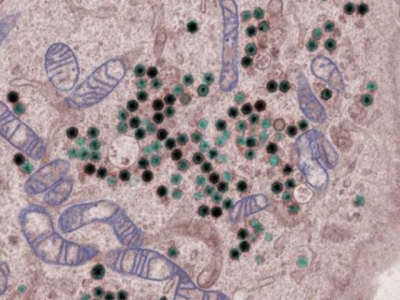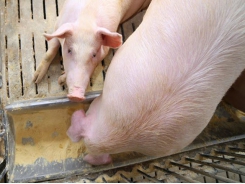ASF vaccine research takes step forward

Scientists at The Pirbright Institute in the U.K. have identified African swine fever virus (ASFV) proteins that can trigger an immune response in pigs, and the team hopes to develop a vaccine using these proteins that is capable of protecting against the deadly disease, the institute said in an announcement.
Pirbright study identifies African swine fever virus proteins that may be used to develop vector vaccine.
Published in Frontiers in Immunology, the study shows that when some pigs were challenged with a virulent strain of ASF after receiving a vaccine that included the identified proteins, the level of virus in the blood was reduced, Pirbright said.
“This demonstrates that this method of vaccination could provide effective protection to pigs, though further work is needed,” said Dr. Chris Netherton, head of the ASF Vaccinology Group at Pirbright.
To determine which ASF proteins should be used in the vaccine, the team screened proteins to find those that activated immune cells in pigs that had previously been infected by a weakened form of ASFV, Pirbright said. The 18 proteins that generated the strongest immune cell response were then transferred into viral vectors — viruses that deliver the ASF proteins to pig cells but are not harmful to pigs.
“ASFV has more than 150 proteins; understanding which of these triggers an immune response is difficult but crucial for creating this kind of vaccine. Now that we have identified proteins that activate pig immune cells, we can work on optimizing the vaccine components to ensure pigs are protected against virulent ASF strains,” Netherton added
ASF infects all pigs and wild boars and can cause fever, loss of appetite, vomiting and bloody diarrhea. The disease is often deadly, with some strains approaching case fatality rates of 100%. Although the virus does not cause disease in humans, it poses a significant threat to food security and has a substantial impact on the economy, especially on trade and farming. ASF has already resulted in the culling of more than 1.1 million pigs in China and nearly 2.5 million pigs in Vietnam alone.
Culling, quarantine and strict biosecurity measures are currently the only defenses farmers can use to prevent ASF spread, Pirbright said.
The development of a safe and effective vaccine is, therefore, vital for preventing the transmission of ASF, the institute explained, noting that it is increasingly urgent considering the rapid spread of the disease through Europe and China.
Pirbright noted that there are various types of ASF vaccines being researched, but relatively little is known about the virus and how the immune system responds to it, which hampers vaccine progression.
Vaccines made with inactivated viruses have not offered protection to domesticated pigs, and although live attenuated vaccines (which contain weakened versions of a live virus) show promise for protection, more testing is needed to ensure their safety, the institute said. Pirbright researchers hope that these vector vaccines will provide an alternative that could help control the spread of this devastating pig disease.
Có thể bạn quan tâm
Phần mềm

Phối trộn thức ăn chăn nuôi

Pha dung dịch thủy canh

Định mức cho tôm ăn

Phối trộn phân bón NPK

Xác định tỷ lệ tôm sống

Chuyển đổi đơn vị phân bón

Xác định công suất sục khí

Chuyển đổi đơn vị tôm

Tính diện tích nhà kính

Tính thể tích ao hồ




 ASF outbreak brings challenges, opportunities for US feed…
ASF outbreak brings challenges, opportunities for US feed…  Initial success achieved in ending surgical swine castration
Initial success achieved in ending surgical swine castration